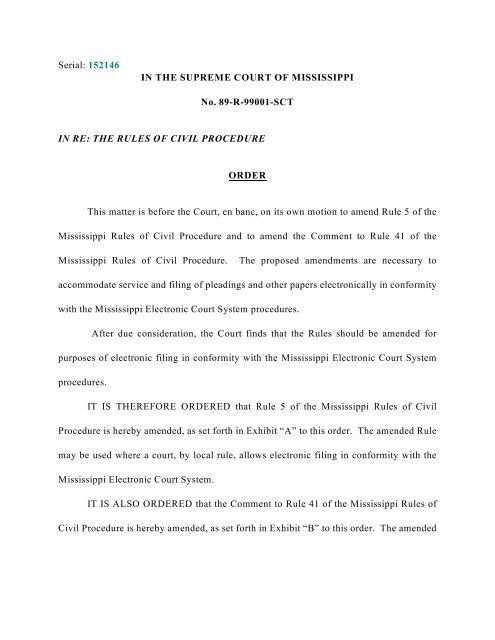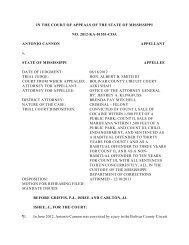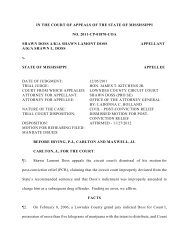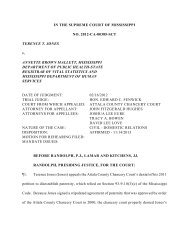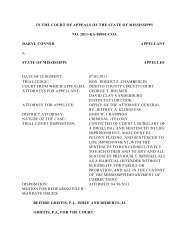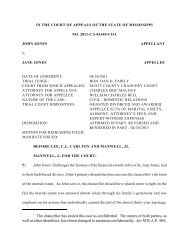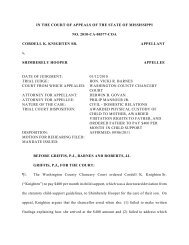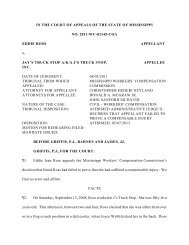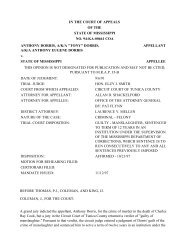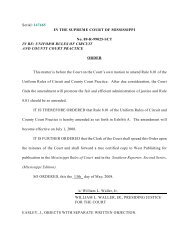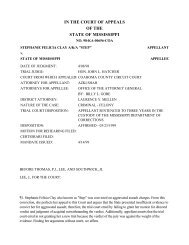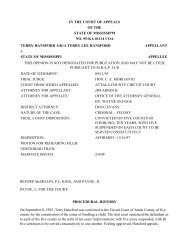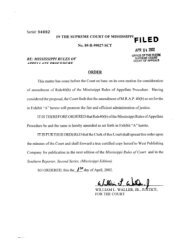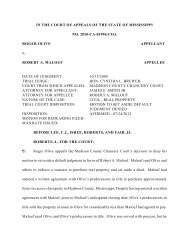The Supreme Court amends Rule 5 and the Comment to Rule 41 of ...
The Supreme Court amends Rule 5 and the Comment to Rule 41 of ...
The Supreme Court amends Rule 5 and the Comment to Rule 41 of ...
You also want an ePaper? Increase the reach of your titles
YUMPU automatically turns print PDFs into web optimized ePapers that Google loves.
Serial: 152146<br />
IN THE SUPREME COURT OF MISSISSIPPI<br />
No. 89-R-99001-SCT<br />
IN RE: THE RULES OF CIVIL PROCEDURE<br />
ORDER<br />
This matter is before <strong>the</strong> <strong>Court</strong>, en banc, on its own motion <strong>to</strong> amend <strong>Rule</strong> 5 <strong>of</strong> <strong>the</strong><br />
Mississippi <strong>Rule</strong>s <strong>of</strong> Civil Procedure <strong>and</strong> <strong>to</strong> amend <strong>the</strong> <strong>Comment</strong> <strong>to</strong> <strong>Rule</strong> <strong>41</strong> <strong>of</strong> <strong>the</strong><br />
Mississippi <strong>Rule</strong>s <strong>of</strong> Civil Procedure. <strong>The</strong> proposed amendments are necessary <strong>to</strong><br />
accommodate service <strong>and</strong> filing <strong>of</strong> pleadings <strong>and</strong> o<strong>the</strong>r papers electronically in conformity<br />
with <strong>the</strong> Mississippi Electronic <strong>Court</strong> System procedures.<br />
After due consideration, <strong>the</strong> <strong>Court</strong> finds that <strong>the</strong> <strong>Rule</strong>s should be amended for<br />
purposes <strong>of</strong> electronic filing in conformity with <strong>the</strong> Mississippi Electronic <strong>Court</strong> System<br />
procedures.<br />
IT IS THEREFORE ORDERED that <strong>Rule</strong> 5 <strong>of</strong> <strong>the</strong> Mississippi <strong>Rule</strong>s <strong>of</strong> Civil<br />
Procedure is hereby amended, as set forth in Exhibit “A” <strong>to</strong> this order. <strong>The</strong> amended <strong>Rule</strong><br />
may be used where a court, by local rule, allows electronic filing in conformity with <strong>the</strong><br />
Mississippi Electronic <strong>Court</strong> System.<br />
IT IS ALSO ORDERED that <strong>the</strong> <strong>Comment</strong> <strong>to</strong> <strong>Rule</strong> <strong>41</strong> <strong>of</strong> <strong>the</strong> Mississippi <strong>Rule</strong>s <strong>of</strong><br />
Civil Procedure is hereby amended, as set forth in Exhibit “B” <strong>to</strong> this order. <strong>The</strong> amended
<strong>Rule</strong> may be used where a court, by local rule, allows electronic filing in conformity with <strong>the</strong><br />
Mississippi Electronic <strong>Court</strong> System.<br />
IT IS FURTHER ORDERED that <strong>the</strong> Clerk <strong>of</strong> this <strong>Court</strong> shall spread this Order upon<br />
<strong>the</strong> minutes <strong>of</strong> this <strong>Court</strong> <strong>and</strong> shall forward a certified copy <strong>to</strong>: West Publishing Company<br />
for publication in <strong>the</strong> Sou<strong>the</strong>rn Reporter, Second Series, (Mississippi Edition) <strong>and</strong> <strong>the</strong><br />
Mississippi <strong>Rule</strong>s <strong>of</strong> <strong>Court</strong>.<br />
SO ORDERED, this <strong>the</strong> 11th day <strong>of</strong> December, 2008.<br />
/s/ William L. Waller, Jr.<br />
WILLIAM L. WALLER, JR., PRESIDING JUSTICE<br />
AGREE: SMITH, C.J., WALLER AND DIAZ, P.JJ., CARLSON, GRAVES, DICKINSON,<br />
RANDOLPH AND LAMAR, JJ.<br />
DISAGREE: EASLEY, J.
Exhibit A<br />
MISSISSIPPI RULES OF<br />
CIVIL PROCEDURE<br />
RULE 5. SERVICE AND FILING OF PLEADINGS<br />
AND OTHER PAPERS<br />
(a) Service: When Required. Except as o<strong>the</strong>rwise provided in <strong>the</strong>se rules, every<br />
order required by its terms <strong>to</strong> be served, every pleading subsequent <strong>to</strong> <strong>the</strong> original complaint<br />
unless <strong>the</strong> court o<strong>the</strong>rwise orders because <strong>of</strong> numerous defendants, every paper relating <strong>to</strong><br />
discovery required <strong>to</strong> be served upon a party unless <strong>the</strong> court o<strong>the</strong>rwise orders, every written<br />
motion o<strong>the</strong>r than one which may be heard ex parte, <strong>and</strong> every written notice, appearance,<br />
dem<strong>and</strong>, <strong>of</strong>fer <strong>of</strong> judgment, designation <strong>of</strong> record on appeal <strong>and</strong> similar paper shall be served<br />
upon each <strong>of</strong> <strong>the</strong> parties. No service need be made on parties in default for failure <strong>to</strong> appear<br />
except that pleadings asserting new or additional claims for relief against <strong>the</strong>m shall be<br />
served upon <strong>the</strong>m in <strong>the</strong> manner provided in <strong>Rule</strong> 4 for service <strong>of</strong> summons. In an action<br />
begun by seizure <strong>of</strong> property, in which no person need be or is named as defendant, any<br />
service required <strong>to</strong> be made prior <strong>to</strong> <strong>the</strong> filing <strong>of</strong> an answer, claim, or appearance shall be<br />
made upon <strong>the</strong> person having cus<strong>to</strong>dy or possession <strong>of</strong> <strong>the</strong> property at <strong>the</strong> time <strong>of</strong> its seizure.<br />
(b) (1) Service: How Made. Whenever under <strong>the</strong>se rules service is required or<br />
permitted <strong>to</strong> be made upon a party who is represented by an at<strong>to</strong>rney <strong>of</strong> record in <strong>the</strong><br />
proceedings, <strong>the</strong> service shall be made upon such at<strong>to</strong>rney unless service upon <strong>the</strong> party<br />
himself is ordered by <strong>the</strong> court. Service upon <strong>the</strong> at<strong>to</strong>rney or upon a party shall be made by<br />
delivering a copy <strong>to</strong> him; or by transmitting it <strong>to</strong> him by electronic means; or by mailing it<br />
<strong>to</strong> him at his last known address, or if no address is known, by leaving it with <strong>the</strong> clerk <strong>of</strong> <strong>the</strong><br />
court, or by transmitting it <strong>to</strong> <strong>the</strong> clerk by electronic means. Delivery <strong>of</strong> a copy within this<br />
rule means: h<strong>and</strong>ing it <strong>to</strong> <strong>the</strong> at<strong>to</strong>rney or <strong>to</strong> <strong>the</strong> party; or leaving it at his <strong>of</strong>fice with his clerk<br />
or o<strong>the</strong>r person in charge <strong>the</strong>re<strong>of</strong>; or, if <strong>the</strong>re is no on one in charge, leaving it in a<br />
conspicuous place <strong>the</strong>rein; or, if <strong>the</strong> <strong>of</strong>fice is closed or <strong>the</strong> person <strong>to</strong> be served has no <strong>of</strong>fice,<br />
leaving it at his dwelling house or usual place <strong>of</strong> abode with some person <strong>of</strong> suitable age <strong>and</strong><br />
discretion <strong>the</strong>n residing <strong>the</strong>rein. Service by electronic means is complete when <strong>the</strong> electronic<br />
equipment being used by <strong>the</strong> at<strong>to</strong>rney or party being served acknowledges receipt <strong>of</strong> <strong>the</strong><br />
material. If <strong>the</strong> equipment used by <strong>the</strong> at<strong>to</strong>rney or party being served does not au<strong>to</strong>matically<br />
acknowledge <strong>the</strong> transmission, service is not complete until <strong>the</strong> sending party obtains an<br />
acknowledgment from <strong>the</strong> recipient. Service by mail is complete upon mailing.<br />
(2) Electronic <strong>Court</strong> System Service: How Made. Where a court has, by local<br />
rule, adopted <strong>the</strong> Mississippi Electronic <strong>Court</strong> System, service which is required or permitted<br />
3
under <strong>the</strong>se rules shall be made in conformity with <strong>the</strong> Mississippi Electronic <strong>Court</strong> System<br />
procedures.<br />
(c) Service: Numerous Defendants. In any action in which <strong>the</strong>re are unusually large<br />
numbers <strong>of</strong> defendants, <strong>the</strong> court, upon motion or <strong>of</strong> its own initiative, may order that service<br />
<strong>of</strong> <strong>the</strong> pleadings <strong>of</strong> <strong>the</strong> defendants <strong>and</strong> replies <strong>the</strong>re<strong>to</strong> need not be made as between <strong>the</strong><br />
defendants, <strong>and</strong> that any cross-claim, counter-claim, or matter constituting an avoidance or<br />
affirmative defense contained <strong>the</strong>rein shall be deemed <strong>to</strong> be denied or avoided by all o<strong>the</strong>r<br />
parties <strong>and</strong> that <strong>the</strong> filing <strong>of</strong> any such pleading <strong>and</strong> service upon <strong>the</strong> plaintiff constitutes due<br />
notice <strong>of</strong> it <strong>to</strong> <strong>the</strong> parties. A copy <strong>of</strong> every such order shall be served upon <strong>the</strong> parties in such<br />
manner <strong>and</strong> form as <strong>the</strong> court directs.<br />
(d) Filing. All papers after <strong>the</strong> complaint required <strong>to</strong> be served upon a party shall be<br />
filed with <strong>the</strong> court ei<strong>the</strong>r before service or within a reasonable time <strong>the</strong>reafter but, unless<br />
ordered by <strong>the</strong> court, discovery papers need not be filed until used with respect <strong>to</strong> any<br />
proceeding. Pro<strong>of</strong> <strong>of</strong> service <strong>of</strong> any paper shall be upon certificate <strong>of</strong> <strong>the</strong> person executing<br />
same.<br />
(e) (1) Filing With <strong>the</strong> <strong>Court</strong> Defined. <strong>The</strong> filing <strong>of</strong> pleadings <strong>and</strong> o<strong>the</strong>r papers with<br />
<strong>the</strong> court as required by <strong>the</strong>se rules shall be made by filing <strong>the</strong>m with <strong>the</strong> clerk <strong>of</strong> <strong>the</strong> court,<br />
except that <strong>the</strong> judge may permit <strong>the</strong> papers <strong>to</strong> be filed with him, in which event he shall note<br />
<strong>the</strong>reon <strong>the</strong> filing date <strong>and</strong> forthwith transmit <strong>the</strong>m <strong>to</strong> <strong>the</strong> <strong>of</strong>fice <strong>of</strong> <strong>the</strong> clerk. Filing may be<br />
accomplished by delivering <strong>the</strong> pleadings or o<strong>the</strong>r papers <strong>to</strong> <strong>the</strong> clerk <strong>of</strong> <strong>the</strong> court or <strong>to</strong> <strong>the</strong><br />
judge, or by transmitting <strong>the</strong>m by electronic means.<br />
(2) Electronic Filing with <strong>Court</strong> Defined. A court may, by local rule, allow<br />
pleadings <strong>and</strong> o<strong>the</strong>r papers <strong>to</strong> be filed, signed, or verified by electronic means in conformity<br />
with <strong>the</strong> Mississippi Electronic <strong>Court</strong> System procedures. Pleadings <strong>and</strong> o<strong>the</strong>r papers filed<br />
electronically in compliance with <strong>the</strong> procedures are written papers for purposes <strong>of</strong> <strong>the</strong>se<br />
rules.<br />
[Amended effective March 1, 1989; Amended effective January 8, 2009, for <strong>the</strong> purpose <strong>of</strong><br />
establishing a pilot program for Mississippi Electronic <strong>Court</strong> System.]<br />
Advisory Committee His<strong>to</strong>rical Note<br />
Effective March 1, 1989, <strong>Rule</strong> 5(b) <strong>and</strong> <strong>Rule</strong> 5(e) were amended by authorizing <strong>the</strong><br />
service <strong>and</strong> filing <strong>of</strong> pleadings <strong>and</strong> documents by electronic means. 536-538 So. 2d XXI<br />
(West Miss. Cas. 1989).<br />
<strong>Comment</strong><br />
4
<strong>The</strong> purpose <strong>of</strong> <strong>Rule</strong> 5 is <strong>to</strong> provide both an expedient method <strong>of</strong> exchanging written<br />
communications between parties <strong>and</strong> an efficient system <strong>of</strong> filing papers with <strong>the</strong> clerk. This<br />
rule presupposes that <strong>the</strong> court has already gained jurisdiction over <strong>the</strong> parties. A "pleading<br />
subsequent <strong>to</strong> <strong>the</strong> original complaint" which asserts a claim for relief against a person over<br />
whom <strong>the</strong> court has not at <strong>the</strong> time acquired jurisdiction must be served upon such person not<br />
a party along with a copy <strong>of</strong> a summons in <strong>the</strong> same manner as <strong>the</strong> copy <strong>of</strong> <strong>the</strong> summons <strong>and</strong><br />
complaint is required <strong>to</strong> be served upon <strong>the</strong> original defendants. See Miss. Code Ann. §<br />
11-5-37 (1972) (answer may be made a cross-bill). However, where a plaintiff has settled<br />
his case, <strong>the</strong> service on him <strong>of</strong> a notice <strong>and</strong> motion <strong>to</strong> intervene is ineffectual <strong>to</strong> bring him<br />
back in<strong>to</strong> court. This is consistent with Mississippi practice, although past procedure did not<br />
recognize intervention. See Hyman v. Cameron, 46 Miss. 725 (1872).<br />
A motion which may be heard ex parte is not required <strong>to</strong> be served, but should be<br />
filed; see also M.R.C.P. 81(b). <strong>The</strong> enumeration <strong>of</strong> papers in <strong>Rule</strong> 5(a) which are required<br />
<strong>to</strong> be served is not exhaustive; also included are affidavits in support <strong>of</strong> or in opposition <strong>to</strong><br />
a motion, <strong>Rule</strong> 6(d), <strong>and</strong> a motion for substitution <strong>of</strong> parties, <strong>Rule</strong> 25.<br />
Discovery papers, referred <strong>to</strong> in <strong>Rule</strong> 5(a), embrace interroga<strong>to</strong>ries, <strong>Rule</strong> 33, requests<br />
for admission, <strong>Rule</strong> 36, <strong>and</strong> requests for production, <strong>Rule</strong> 34. Responses served under <strong>the</strong><br />
provisions <strong>of</strong> any <strong>of</strong> <strong>the</strong>se rules must also be served on all parties.<br />
<strong>The</strong> Administrative Office <strong>of</strong> <strong>Court</strong>s (AOC) is authorized <strong>to</strong> establish procedures for<br />
a comprehensive electronic case management <strong>and</strong> electronic filing system known as <strong>the</strong><br />
Mississippi Electronic <strong>Court</strong> System (MEC). Please refer <strong>to</strong> <strong>the</strong> Administrative Procedures<br />
for Mississippi Electronic <strong>Court</strong> System on <strong>the</strong> <strong>Supreme</strong> <strong>Court</strong>’s website at www.<br />
mssc.state.ms.us. While <strong>the</strong> use <strong>of</strong> <strong>the</strong> MEC is optional for <strong>the</strong> chancery, circuit, <strong>and</strong> county<br />
courts, <strong>the</strong> procedures must be followed where a court has adopted <strong>and</strong> implemented <strong>the</strong><br />
MEC by local rule. <strong>The</strong>refore, <strong>to</strong> <strong>the</strong> extent <strong>the</strong> MEC procedures address service <strong>and</strong> filing<br />
<strong>of</strong> pleadings <strong>and</strong> o<strong>the</strong>r papers, <strong>the</strong> procedures should be followed <strong>to</strong> satisfy <strong>Rule</strong> 5(e) <strong>and</strong><br />
<strong>Rule</strong> 5(b). For purposes <strong>of</strong> <strong>Rule</strong> 5(e), <strong>the</strong> MEC procedures provide reasonable exceptions<br />
<strong>to</strong> <strong>the</strong> requirement <strong>of</strong> electronic filing.<br />
A secondary purpose <strong>of</strong> <strong>Rule</strong> 5(c) is <strong>to</strong> permit <strong>the</strong> court <strong>to</strong> alleviate some <strong>of</strong> <strong>the</strong><br />
difficulties in actions where <strong>the</strong>re are unusually large numbers <strong>of</strong> defendants. <strong>Rule</strong> 5(c) is<br />
<strong>the</strong> only instance in which <strong>the</strong> provisions <strong>of</strong> <strong>Rule</strong> 7(a) (pleadings allowed) are permitted <strong>to</strong><br />
be relaxed. This relaxation extends only <strong>to</strong> replies <strong>to</strong> counter-claims <strong>and</strong> answers <strong>to</strong><br />
cross-claims; o<strong>the</strong>r pleadings <strong>and</strong> all motions must still be served in <strong>the</strong> usual manner.<br />
<strong>Rule</strong> 5(d) recognizes both <strong>the</strong> expense <strong>of</strong> making additional transcripts <strong>of</strong> recordings<br />
<strong>and</strong> duplicating exhibits or attachments <strong>to</strong> discovery papers, <strong>and</strong> <strong>the</strong> fact that <strong>the</strong> routine<br />
filing <strong>of</strong> such items can engulf <strong>the</strong> space in a clerk's <strong>of</strong>fice. Accordingly, papers produced<br />
in <strong>the</strong> course <strong>of</strong> discovery need not be filed with <strong>the</strong> court unless <strong>the</strong>y are relevant <strong>to</strong> some<br />
proceeding or <strong>the</strong> court so directs, nor must all discovery papers be filed if only some <strong>of</strong> <strong>the</strong>m<br />
5
are required for <strong>the</strong> disposition <strong>of</strong> some motion or proceeding. M.R.C.P. 5(d) differs from<br />
Federal <strong>Rule</strong> 5(d) in <strong>the</strong> preceding respect, but accords with <strong>the</strong> recommendations <strong>of</strong> <strong>the</strong><br />
American Bar Association for correcting abuses in <strong>the</strong> discovery procedures. See Special<br />
Committee for <strong>the</strong> Study <strong>of</strong> Discovery Abuse, Section <strong>of</strong> Litigation, A.B.A., Report, at 1, 2<br />
(1977).<br />
Of fur<strong>the</strong>r significance in <strong>Rule</strong> 5(d) is that, although service must be made within <strong>the</strong><br />
times prescribed, filing is permitted <strong>to</strong> be made within a reasonable time <strong>the</strong>reafter. See<br />
Blank v. Bitker, 135 F.2d 962 (7th Cir. 1943). Instances requiring <strong>the</strong> pleading <strong>to</strong> be filed<br />
before it is served include <strong>Rule</strong> 3 (complaint) <strong>and</strong> any o<strong>the</strong>r pleading stating a claim for relief<br />
which it is necessary <strong>to</strong> serve with a summons. Pursuant <strong>to</strong> <strong>Rule</strong> 5(c) (numerous defendants)<br />
<strong>the</strong> filing <strong>of</strong> a pleading, coupled with service on <strong>the</strong> plaintiff, is notice <strong>to</strong> <strong>the</strong> parties. <strong>Rule</strong><br />
65(b) requires temporary restraining orders <strong>to</strong> be filed forthwith in <strong>the</strong> clerk's <strong>of</strong>fice.<br />
To obtain immediate court action under <strong>Rule</strong> 5(e), a party may file his papers with <strong>the</strong><br />
judge, if <strong>the</strong> latter permits, <strong>and</strong> obtain such order as <strong>the</strong> judge deems proper. <strong>Rule</strong> 5(e)<br />
should be read in conjunction with <strong>Rule</strong>s 77(a) (courts always open), 77(b) (trials <strong>and</strong><br />
hearings; orders in chambers), <strong>and</strong> 77(c) (clerk's <strong>of</strong>fice <strong>and</strong> orders by clerk).<br />
<strong>Rule</strong> 5(b) has no application <strong>to</strong> service <strong>of</strong> summons; that subject is completely covered<br />
by <strong>Rule</strong> 4.<br />
For general discussions <strong>of</strong> <strong>the</strong> federal rule analogous <strong>to</strong> M.R.C.P. 5, see 1 Wright &<br />
Miller, Federal Practice <strong>and</strong> Procedure, Civil §§71-82 (1969), <strong>and</strong> 2 Moore's Federal Practice<br />
5.01-5.11 (1975).<br />
6
. . . .<br />
<strong>Comment</strong><br />
Exhibit B<br />
MISSISSIPPI RULES OF CIVIL<br />
PROCEDURE<br />
RULE <strong>41</strong>. DISMISSAL OF ACTIONS<br />
<strong>The</strong> purpose <strong>of</strong> <strong>Rule</strong> <strong>41</strong> is <strong>to</strong> establish a uniform rule governing voluntary <strong>and</strong><br />
involuntary dismissals <strong>of</strong> actions. <strong>Rule</strong> <strong>41</strong>(a), which permits a plaintiff voluntarily <strong>to</strong> dismiss<br />
his action, is intended <strong>to</strong> give him <strong>the</strong> right <strong>to</strong> take <strong>the</strong> case out <strong>of</strong> court if no o<strong>the</strong>r party will<br />
be prejudiced. <strong>The</strong> right is limited by <strong>the</strong> rule <strong>to</strong> <strong>the</strong> period before answer or motion for<br />
summary judgment; <strong>the</strong>reafter dismissal can be had only with consent <strong>of</strong> <strong>the</strong> court <strong>and</strong> on<br />
such conditions as are just.<br />
<strong>Rule</strong> <strong>41</strong>(a)(1) provides two methods by which a plaintiff may dismiss an action<br />
without obtaining <strong>the</strong> consent <strong>of</strong> <strong>the</strong> court: He may do so at any time by stipulation <strong>of</strong> all <strong>the</strong><br />
parties; he may do so prior <strong>to</strong> service <strong>of</strong> an answer or <strong>of</strong> a motion for summary judgment by<br />
his own unilateral act <strong>of</strong> filing a notice <strong>of</strong> dismissal with <strong>the</strong> court.<br />
<strong>The</strong> defenses listed in <strong>Rule</strong> 12(b) may, at <strong>the</strong> option <strong>of</strong> <strong>the</strong> defendant, be asserted in<br />
an answer or by motion <strong>to</strong> dismiss. If <strong>the</strong>y are included in an answer, <strong>the</strong> service <strong>of</strong> <strong>the</strong><br />
answer terminates plaintiff's right <strong>to</strong> dismiss by notice. Plaintiff's right <strong>of</strong> voluntary dismissal<br />
is not cut <strong>of</strong>f if <strong>the</strong> defense is put forward by motion <strong>to</strong> dismiss. A motion <strong>to</strong> dismiss is<br />
nei<strong>the</strong>r an answer nor, unless accompanied by affidavits stating matters outside <strong>the</strong> pleadings<br />
that are not excluded by <strong>the</strong> court, a motion for summary judgment; a motion <strong>to</strong> dismiss does<br />
not terminate <strong>the</strong> right <strong>of</strong> dismissal by notice, nor does a motion for a stay or a motion for<br />
change <strong>of</strong> venue.<br />
<strong>The</strong> o<strong>the</strong>r procedure for voluntary dismissal, in addition <strong>to</strong> dismissal by notice, a<br />
dismissal by stipulation <strong>of</strong> all <strong>the</strong> parties. Dismissal by stipulation may be had at any time.<br />
A stipulation will not be construed as being for dismissal in <strong>the</strong> absence <strong>of</strong> an unequivocal<br />
statement by <strong>the</strong> parties that it was so intended.<br />
Dismissal by stipulation is without prejudice unless <strong>the</strong> stipulation provides that it is<br />
<strong>to</strong> be with prejudice. A voluntary dismissal by stipulation is effective immediately <strong>and</strong> does<br />
not require judicial approval.<br />
<strong>The</strong> procedure under MRCP <strong>41</strong>(a)(1) is contrary <strong>to</strong> past Mississippi nonsuit practice,<br />
which permitted <strong>the</strong> plaintiff <strong>to</strong> voluntarily dismiss his suit without prejudice at any time<br />
7
efore <strong>the</strong> case was submitted <strong>to</strong> <strong>the</strong> jury. Miss. Code Ann. § 11-7-125; See also Miss. Code<br />
Ann. § 11-7-127 (1972) (plaintiff may take a nonsuit before <strong>the</strong> clerk in vacation); Allison<br />
v. Camp Creek Drainage Dist., 211 Miss. 354, 364, 51 So.2d 743, 747 (1951) (plaintiff in<br />
chancery action may nonsuit without prejudice up <strong>to</strong> time cause is submitted <strong>to</strong> chancellor<br />
for final decision on <strong>the</strong> merits); but see Adams v. Lucedale Commercial Co., 113 Miss. 608,<br />
74 So. 435 (1917). It is also contrary <strong>to</strong> practice under Federal <strong>Rule</strong> <strong>41</strong>(a), which permits<br />
only one voluntary nonsuit at any time before defendant's responsive pleading is made.<br />
Although Miss. Code Ann. §§ 11-27-125 <strong>and</strong> -127 (1972) are couched in terms<br />
ostensibly granting an absolute right <strong>to</strong> <strong>the</strong> plaintiff <strong>to</strong> nonsuit before <strong>the</strong> cause is submitted,<br />
<strong>the</strong> statutes have not been so interpreted, particularly in chancery practice: "When in any<br />
respect <strong>the</strong> cause has proceeded <strong>to</strong> that point . . . that <strong>the</strong> defendant has . . . secured some<br />
substantial right which would be destroyed by <strong>the</strong> dismissal, it should not be permitted."<br />
Mitchell v. Film Transit Co., 194 Miss. 550, 13 So.2d 154 (1943). See also V. Griffith,<br />
Mississippi Chancery Practice, § 534 (2d ed. 1950).<br />
<strong>The</strong> trial court has no power <strong>to</strong> impose terms <strong>and</strong> conditions if a plaintiff properly<br />
dismisses by notice under <strong>Rule</strong> <strong>41</strong>(a)(1). Nor may <strong>the</strong> plaintiff seek <strong>to</strong> make a conditional<br />
dismissal under that portion <strong>of</strong> <strong>the</strong> rule. If dismissal is by stipulation under <strong>Rule</strong> <strong>41</strong>(a)(1),<br />
<strong>the</strong> parties work out for <strong>the</strong>mselves <strong>the</strong> conditions on which <strong>the</strong>y will enter in<strong>to</strong> <strong>the</strong><br />
stipulation. Accordingly, <strong>the</strong> authority <strong>of</strong> <strong>the</strong> court <strong>to</strong> require "such terms <strong>and</strong> conditions as<br />
<strong>the</strong> court deems proper" is limited <strong>to</strong> a motion for dismissal under <strong>Rule</strong> <strong>41</strong>(a)(2).<br />
<strong>The</strong> terms <strong>of</strong> conditions that may be imposed upon <strong>the</strong> granting <strong>of</strong> a motion for<br />
voluntary dismissal are for <strong>the</strong> protection <strong>of</strong> <strong>the</strong> defendant, although if one <strong>of</strong> several<br />
plaintiffs moves for dismissal conditions may be imposed for <strong>the</strong> protection <strong>of</strong> <strong>the</strong> remaining<br />
plaintiffs. <strong>The</strong> court may dismiss without conditions if <strong>the</strong>y have not been shown <strong>to</strong> be<br />
necessary, but should at least require that <strong>the</strong> plaintiff pay <strong>the</strong> costs <strong>of</strong> <strong>the</strong> litigation. In<br />
imposing conditions <strong>the</strong> court is not limited <strong>to</strong> taxable costs, but may require <strong>the</strong> plaintiff <strong>to</strong><br />
compensate for all <strong>of</strong> <strong>the</strong> expenses <strong>to</strong> which his adversary has been put; <strong>the</strong> court may<br />
require plaintiff <strong>to</strong> pay <strong>the</strong> defendant's at<strong>to</strong>rney's fees as well as o<strong>the</strong>r costs <strong>and</strong><br />
disbursements.<br />
Dismissal on motion under <strong>Rule</strong> <strong>41</strong>(a)(2) is within <strong>the</strong> sound discretion <strong>of</strong> <strong>the</strong> court,<br />
<strong>and</strong> its order is reviewable only for abuse <strong>of</strong> discretion. <strong>The</strong> discretion given <strong>the</strong> court by<br />
<strong>Rule</strong> <strong>41</strong>(a)(2) is a judicial, ra<strong>the</strong>r than an arbitrary, discretion. If necessary, a hearing should<br />
be held <strong>and</strong> <strong>the</strong> court should endeavor <strong>to</strong> ensure substantial justice <strong>to</strong> both parties.<br />
<strong>The</strong> purpose <strong>of</strong> <strong>Rule</strong> <strong>41</strong>(a)(2) is primarily <strong>to</strong> prevent voluntary dismissal which<br />
unfairly affects <strong>the</strong> o<strong>the</strong>r side, <strong>and</strong> <strong>to</strong> permit <strong>the</strong> imposition <strong>of</strong> curative conditions.<br />
Accordingly, <strong>the</strong> dismissal should be allowed generally unless <strong>the</strong> defendant will suffer some<br />
plain legal prejudice o<strong>the</strong>r than <strong>the</strong> mere prospect <strong>of</strong> a second law suit. It is not a bar <strong>to</strong><br />
dismissal that plaintiff may obtain some tactical advantage <strong>the</strong>reby.<br />
8
<strong>The</strong> second sentence <strong>of</strong> <strong>Rule</strong> <strong>41</strong>(a)(2) provides that if a counter-claim has been<br />
pleaded by a defendant prior <strong>to</strong> <strong>the</strong> service upon him <strong>of</strong> <strong>the</strong> plaintiff's motion <strong>to</strong> dismiss, <strong>the</strong><br />
action shall not be dismissed against <strong>the</strong> defendant's objection unless <strong>the</strong> counter-claim can<br />
remain pending for independent adjudication by <strong>the</strong> court. <strong>The</strong> purpose <strong>of</strong> <strong>the</strong> rule is <strong>to</strong><br />
preserve <strong>the</strong> court's jurisdiction over <strong>the</strong> parties <strong>and</strong> <strong>the</strong> counter-claim. Ordinarily <strong>the</strong><br />
counter-claim can st<strong>and</strong> on its own <strong>and</strong> dismissal can be granted without affecting <strong>the</strong><br />
counter-claim. If <strong>the</strong> counter-claim is compulsory, <strong>the</strong> court has jurisdiction <strong>to</strong> decide it even<br />
though <strong>the</strong> plaintiff claim is dismissed; if <strong>the</strong> counter-claim is permissive, it will ordinarily<br />
require independent grounds for jurisdiction <strong>and</strong> <strong>the</strong>se independent grounds permit it <strong>to</strong><br />
remain pending. Thus, <strong>the</strong> rule applies only when <strong>the</strong>re is a permissive counter-claim that<br />
can be maintained without an independent ground <strong>of</strong> jurisdiction, as when it is a se<strong>to</strong>ff, or<br />
in o<strong>the</strong>r unusual circumstances in which <strong>the</strong> counter-claim would fall if <strong>the</strong> plaintiff's claim<br />
were dismissed.<br />
<strong>Rule</strong> <strong>41</strong>(b) allows <strong>the</strong> court <strong>to</strong> dismiss an action involuntarily for three different<br />
causes: dismissal at <strong>the</strong> close <strong>of</strong> <strong>the</strong> plaintiff's evidence for failure <strong>to</strong> show a right <strong>to</strong> relief,<br />
which operates as a decision on <strong>the</strong> merits, dismissal for want <strong>of</strong> prosecution, which is a<br />
penalty for dila<strong>to</strong>riness, See Miss. Code Ann. § 11-53-25 (1972) (dismissal for want <strong>of</strong><br />
prosecution); <strong>and</strong> dismissal for failure <strong>to</strong> comply with "<strong>the</strong>se rules" or any order <strong>of</strong> <strong>the</strong> court;<br />
see Sherwin Williams Co. v. Feld Bros. & Co., 139 Miss. 21, 28, 103 So. 795, 796 (1925)<br />
(plaintiff may be nonsuited by <strong>the</strong> court for failure <strong>to</strong> comply with order <strong>to</strong> make declaration<br />
more specific). Unless o<strong>the</strong>rwise specifically ordered by <strong>the</strong> court, an involuntary dismissal<br />
under <strong>Rule</strong> <strong>41</strong>(b) ordinarily operates as an adjudication upon <strong>the</strong> merits <strong>and</strong> is with prejudice.<br />
See 9 Wright & Miller, Federal Practice <strong>and</strong> Procedure, Civil §§ 2369-2373 (1971).<br />
However, past Mississippi practice has tempered this harsh result by allowing dismissed<br />
cases <strong>to</strong> be reinstituted, except in extreme situations. See, e. g, Ross v. Milner, 194 Miss.<br />
497, 505-06, 12 So.2d 917, 918 (1943) (where order did not recite that cause was dismissed<br />
without prejudice, it was considered as being dismissed with prejudice); Peoples Bank v.<br />
D'Lo Royalties, Inc., 206 So.2d 836, 837 (Miss.1968) (dismissal is a drastic punishment<br />
which should not be invoked except where conduct <strong>of</strong> parties has been so deliberately<br />
careless as <strong>to</strong> call for such action).<br />
<strong>Rule</strong> <strong>41</strong>(c) provides that <strong>the</strong> o<strong>the</strong>r subdivisions <strong>of</strong> <strong>Rule</strong> <strong>41</strong>, stating <strong>the</strong> procedures for<br />
<strong>and</strong> consequences <strong>of</strong> dismissals, apply <strong>to</strong> <strong>the</strong> dismissal <strong>of</strong> a counter-claim, cross-claim, or<br />
third-party claim.<br />
One exception is allowed for <strong>Rule</strong> <strong>41</strong>(c) matters because <strong>the</strong> right <strong>of</strong> voluntary<br />
dismissal with notice, MRCP <strong>41</strong>(a)(1), is terminated by an answer. This will not work for<br />
counter-claims, cross-claims, or third-party claims, since defendant will ordinarily assert<br />
<strong>the</strong>se with or subsequent <strong>to</strong> his answer. Accordingly, <strong>Rule</strong> <strong>41</strong>(c) provides that a voluntary<br />
dismissal by a defendant, or o<strong>the</strong>r claimant, <strong>of</strong> a counter-claim, cross-claim, or third-party<br />
claim must be made before a responsive pleading is served or, if none, before <strong>the</strong><br />
introduction <strong>of</strong> evidence at <strong>the</strong> trial. MRCP <strong>41</strong>(a)(1) also provides that <strong>the</strong> service <strong>of</strong> a<br />
9
motion for summary judgment also terminates <strong>the</strong> right <strong>to</strong> dismiss by notice. As a matter <strong>of</strong><br />
logic <strong>and</strong> judicial consistency, if a motion for summary judgment defeats plaintiff's right <strong>to</strong><br />
dismiss, <strong>the</strong>n it should also defeat <strong>the</strong> right <strong>of</strong> a defendant <strong>to</strong> dismiss his counter-claim,<br />
cross-claim, or third-party claim. See 9 Wright & Miller, supra, § 2374.<br />
<strong>Rule</strong> <strong>41</strong>(d) authorizes <strong>the</strong> clerk <strong>to</strong> move for dismissal <strong>of</strong> cases in which <strong>the</strong>re has been<br />
no action <strong>of</strong> record during <strong>the</strong> preceding 12 months. <strong>The</strong> clerk is required <strong>to</strong> give notice <strong>of</strong><br />
such action <strong>to</strong> <strong>the</strong> opposing parties who may counter <strong>the</strong> clerk's motion <strong>to</strong> retain <strong>the</strong> case on<br />
<strong>the</strong> court's docket. This provision supersedes Miss. Code Ann. § 11-53-25 (1972) (clerk shall<br />
move for dismissal <strong>of</strong> any cause pending in which no action has been taken for <strong>the</strong> two<br />
preceding terms). <strong>The</strong> statute did not require notice <strong>of</strong> <strong>the</strong> dismissal -- <strong>the</strong> parties were<br />
deemed <strong>to</strong> be before <strong>the</strong> court in cases pending on <strong>the</strong> active docket. Ross v. Milner, supra.<br />
If a court has implemented <strong>the</strong> Mississippi Electronic <strong>Court</strong> System, <strong>the</strong> notice required by<br />
<strong>Rule</strong> <strong>41</strong>(d) may be sent in <strong>the</strong> same manner as o<strong>the</strong>r notices consistent with <strong>the</strong> Mississippi<br />
Electronic <strong>Court</strong> System procedures. Please refer <strong>to</strong> <strong>the</strong> Administrative Procedures for<br />
Mississippi Electronic <strong>Court</strong> System on <strong>the</strong> <strong>Supreme</strong> <strong>Court</strong>’s website at www.<br />
mssc.state.ms.us.<br />
Under <strong>Rule</strong> <strong>41</strong>(e), if a plaintiff who has once dismissed an action in any court<br />
commences ano<strong>the</strong>r action on <strong>the</strong> same claim against <strong>the</strong> same defendant, <strong>the</strong> court may<br />
require <strong>the</strong> payment <strong>of</strong> costs in <strong>the</strong> prior action before proceeding with <strong>the</strong> latter. <strong>The</strong> matter<br />
is discretionary with <strong>the</strong> court. <strong>Rule</strong> <strong>41</strong>(e) by its terms is applicable only when <strong>the</strong> plaintiff<br />
"has once dismissed an action"; thus, it does not cover cases in which <strong>the</strong>re was an<br />
involuntary dismissal <strong>of</strong> <strong>the</strong> prior action by <strong>the</strong> court. This accords with prior practice<br />
pursuant <strong>to</strong> Miss. Code Ann. §§ 11-7-127 <strong>and</strong> 11-53-25 (1972).<br />
10


